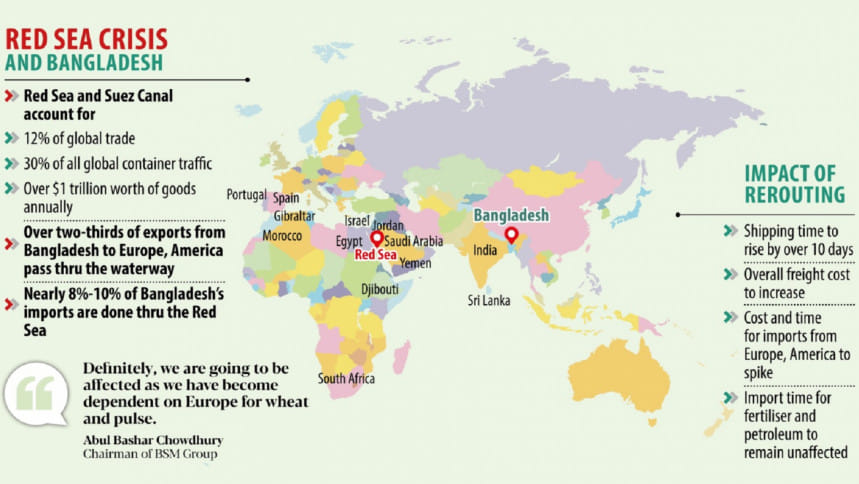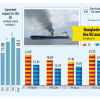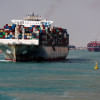What does it mean for Bangladesh?

In recent weeks, the Red Sea has drawn huge attention owing to its importance in international trade.
Global shipping companies are rerouting vessels around Africa's Cape of Good Hope to avoid the Red Sea in the face of attacks from Yemen's Houthi rebels.
As a result, the shipping time will increase by more than 10 days, raising the freight costs.
Bangladesh will not remain immune from the crisis as a good portion of its around $130 billion trade with other nations goes through the waterway, which extends southeastward from the Suez of Egypt, for about 1,200 miles to the Bab el-Mandeb Strait, connecting with the Gulf of Aden and then with the Arabian Sea in the Indian ocean.
Exporters and shipping sector insiders say roughly 70 percent of Bangladesh's export, destined for Europe and America, the two major markets, cross the waterway. It also uses the route to import, particularly essential commodities such as wheat, pulses and soybeans from Russia, Ukraine, Romania and the US.
"Definitely, we are going to be affected as we have become dependent on Europe for wheat and pulse," said Abul Bashar Chowdhury, chairman of BSM Group, a commodity importer based in Chattogram.
As ships are rerouted, owners are demanding a $10-$12 additional as the freight rate. Not only that, it will be tough to get ships if the crisis lingers.
"Ultimately, the burden will fall on consumers," Chowdhury said.
According to global media, the Houthis have been attacking vessels since the third week of October in solidarity with Palestinians in war-ravaged Gaza. The group says it will target the vessels linked to Israel.
As more ships avoid the Red Sea, tonnage transiting the Bab al-Mandab Strait chokepoint has dropped by more than half since the beginning of December, said S&P Global Commodity Insights on December 21.
Around 12 percent of global trade passes through the Suez Canal, representing 30 percent of all global container traffic and more than $1 trillion worth of goods annually.
Since November, at least 25 commercial vessels operating in the southern Red Sea and the Gulf of Aden have been attacked, AFP reported.
On January 5, Maersk said it is diverting all container vessels from Red Sea routes around the Cape of Good Hope for the foreseeable future, warning customers to prepare for a significant disruption, while Hapag Lloyd tallied a big increase in costs of diverting ships.
Khairul Alam Suzan, a vice-president of the Bangladesh Freight Forwarders Association, said the use of the Red Sea cuts the distance by 3,000-4,000 kilometres.
"As vessels are avoiding the waterway, the overall import cost will go up," said Taslim Shahriar, senior assistant general manager of Meghna Group of Industries, a major commodity importer and processor.
"This will also compound pressure on the already strained foreign exchange reserves of the country as the increased cost of frights will have to be borne in foreign currencies."
Syed M Tanvir, managing director of Pacific Jeans, one of the leading garment exporters in Bangladesh, says definitely, there are reasons to be concerned about.
"Most readymade garments from Bangladesh are shipped through this route. As ships will go around the Cape of Good Hope, a portion of the additional cost will apparently be passed to us by buyers. So, businesses will be affected at this challenging time."
There is another challenge.
Exporters will be under more pressure from buyers to ship garments within the lead time. Until now, they were able to seek some extra time from buyers in the case of failure to meet the deadline. The change in the route will make it harder.
"So, we will have to deliver products fast. Buyers may also seek discounts from us," said Fazlul Hoque, managing director of Plummy Fashions Ltd, a green factory making exportable knitwear.
One respite is the crisis in the Red Sea is global and Bangladesh's competing countries will also find themselves in a similar situation.
"But we may face pressure when it comes to early delivery. If we fail, we may have to go for air shipments," said Faruque Hassan, president of the Bangladesh Garment Manufacturers and Exporters Association.
The shipment time for fertilizer and fuel is likely to remain unaffected as Bangladeshi suppliers use different routes, according to officials of the agriculture ministry and the Bangladesh Petroleum Corporation.
Bangladesh imports fertilizer mainly through the Cape of Good Hope and the Arabian Sea. So, the shipping time is not going to increase but the freight charge has already gone up, said an official of the agriculture ministry.
Bangladesh's flag carrier vessels have also remained unaffected until now.
Commodore Md Ziaul Hoque, managing director of the Bangladesh Shipping Corporation, said the Red Sea trade route has not been closed yet and a huge volume of traffic is moving.
"The Houthis say they will target ships linked only to Israel, so the risk of vessels carrying Bangladeshi flag may be low since we are a Muslim-majority nation. However, we are monitoring the situation."

 For all latest news, follow The Daily Star's Google News channel.
For all latest news, follow The Daily Star's Google News channel. 






Comments